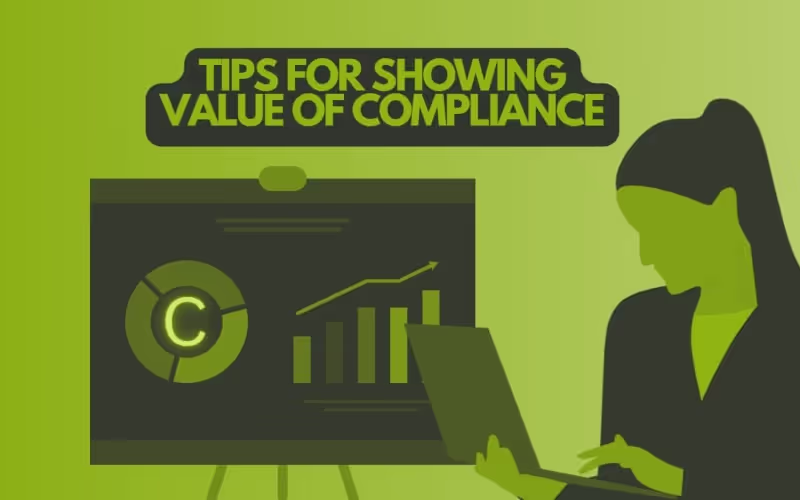
5 Tips for Compliance Officers to Show Business Value
Whether you're an anti-money laundering (AML) officer, a sanctions operations manager, or wear any cap that says regulatory on it, compliance professionals can struggle with this issue: Demonstrating their value to the business. This article reveals five tips that help establish compliance teams as strategic partners rather than just cost centers.
The Challenge of Showing Value as a Compliance Professional
Without compliance professionals, what would happen? The business may find itself in a legal quagmire struggling to function - with criminal liability on the table too. Compliance teams play a crucial role in safeguarding a company's reputation, avoiding regulatory penalties, and maintaining the trust of customers and investors.
However, there is a problem. Despite their importance, compliance professionals may, unfortunately, be seen internally as regulatory box tickers.
Although not all companies and organizations contain these attitudes - many certainly do. And it's not uncommon for compliance officers to come across negativity during their careers, especially as they may get in the way of potential deals that boost the company's bottom line (and put money in their colleagues' bonus pot).
Overall, there isn't always a positive internal perception of a job so fundamental to the business functioning. But now for the good news: It's just a perception. And improving it is possible with the following five tips.
Ways Compliance Officers Can Show Value to the Business
We will now cover the following essential tips for compliance officers to show incredible value to the business:
- Tip 1: Position Compliance as a Resource (Not An Internal Police Force)
- Tip 2: Proactively Show Compliance Is a Competitive Advantage
- Tip 3: Embrace Technology for Valuable Internal Compliance Reporting
- Tip 4: Engagement with Senior Management is Key
- Tip 5: Don't Forget to Be a Good Storyteller
Tip 1: Position Compliance as a Resource (Not An Internal Police Force)
As mentioned earlier, general employees and executives in the boardroom may automatically view compliance as box-ticking exercises and draining cost centers to the business.
But another unfortunate view is this: It's also an internal police force.
To an extent, this perception has some merit. After all, compliance teams are internal enforcers of rules and regulations that the company is legally obliged to follow. However, it can naturally create tensions and conflicts within an organization. Why? Because compliance requirements may act as barriers to innovation and growth.
Compliance teams can overcome this perception by positioning themselves as a resource to the business. Ways to achieve this include:
- Providing support and guidance to employees
- Offering compliance training and education
- Working collaboratively with departments
In addition, compliance teams should form strong relationships with the internal communications department. Effective communication with internal stakeholders is crucial in creating a favorable perception of the compliance team.
It's also becoming increasingly common for departments to have their own internal communications strategy. For example, delivering monthly newsletters to the broader business that promotes the team as a helpful resource would be essential to that plan.
Tip 2: Proactively Show Compliance Is a Competitive Advantage
Here is a fact: Robust compliance programs bring competitive advantages to businesses, such as:
- Improved Reputation
- Access to New Markets
- Better Investor Relations
- Reduced Risk
- Increased Efficiency
The problem is that most internal stakeholders don't easily connect compliance to the above competitive upsides. Therefore, compliance professionals must proactively demonstrate tangible advantages wherever possible. Let's create an example.
Imagine this scenario: You are browsing a compliance news publication online and learn that the US Office of Foreign Assets Control (OFAC) has fined a competitor for a sanctions breach. It's an interesting read. And, of course, you are happy that your company uses a service like sanctions.io to stay atop the ever-changing OFAC sanctions lists. But what do you do next?
Firstly, a smart move would be to ensure that all internal stakeholders know about the competitor's sanctions breach and punishment (for example, through an internal newsletter). Secondly: Inform the business of the steps your excellent team takes to ensure the company is compliant, maintaining its competitive edge through its commitment to compliance.
Tip 3: Embrace Technology for Valuable Internal Compliance Reporting
From AML risk assessments to regulatory filings, compliance professionals are used to creating reports for various internal and external audiences. It's one of the most critical facets of the job. But let's turn our attention to the internal side of the coin.
And the fact is this: Compliance officers can entrench themselves so deeply into the complicated regulatory paperwork that it's possible to lose sight of the big picture for the business.
Yes, the regulatory specifics and details are essential. However, in all internal compliance reports, stakeholders should walk away knowing why the information in the report is critical and valuable for the business.
Fortunately, the advances in regulatory technology (RegTech) are making this objective easier for compliance. But how?
In the past, significant time was spent on data collection - leaving fewer resources for broad analysis. But today, things are changing fast. Compliance teams that embrace RegTech services, such as sanctions.io, can now automate and streamline these processes, freeing up more time to develop valuable insights for the business.
Tip 4: Engagement with Senior Management is Key
The following is a fascinating statistic from 1918 frequently quoted in business circles - even today. With other collaborators, Harvard University found that 85% of job success is down to having well‐developed soft and people skills.
The research is over 100 years old, and the world has changed significantly. But developing excellent soft skills continues to be as crucial as ever to career success. That's why the classic self-help book, How to Win Friends and Influence People, continues as a best-seller.
And the point is this: Regardless of technical skills and impressive qualifications, compliance professionals with excellent people skills who effectively manage up the organization and engage senior managers may naturally be perceived as more valuable.
Tip 5: Don't Forget to Be a Good Storyteller
Compliance officers should also embrace the final tip to show value to the business. We live in a world where ROIs and KPIs are king - and the compliance industry is no different. However, it's crucial to remember that stakeholders are people, and people are more likely to be influenced by a compelling story than a list of numbers or regulations.
Metrics are essential. And the boardroom requires data-driven reports. But compliance teams should also integrate real stories into the key messages they deliver to the business. To move away from box-ticking stereotypes, compliance officers can remind internal stakeholders why regulations exist.
And why do they? Society has decided that regulations are a good idea because, for example, financial crimes such as money laundering and sanctions evasion are connected to some of the most heinous crimes on the planet, such as terrorism and human trafficking.
Therefore, compliance officers must be compelling storytellers - conveying internally the value their work plays in preventing criminals from using their business as a facilitator for damaging crimes.
And creating engagement is easy. After all, money laundering and other financial crimes naturally intrigue people - that's why movies and Netflix shows cover these topics.
How Can sanctions.io Help Compliance Teams Show Value?
If you would like to learn more about how sanctions.io can strengthen the compliance goals within your organization, you can take advantage of our free, no-obligation discovery call with our team. Book here. We enable intelligent AI-powered sanctions, PEP, and criminal watchlist screening for your AML, KYC & trade compliance screening needs.



